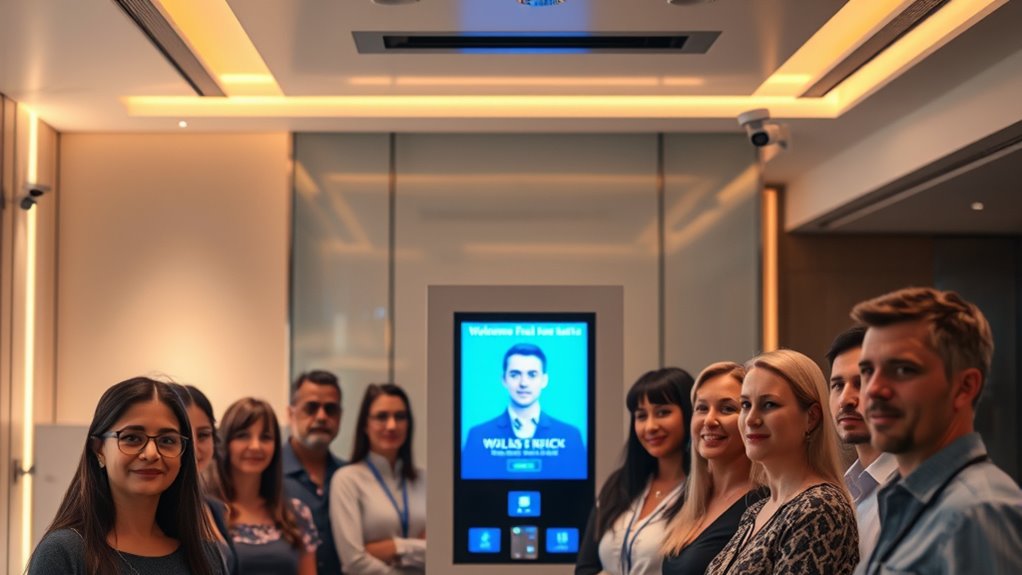Using facial recognition for hotel check-ins raises ethical concerns about privacy, consent, and data security. You might worry about your sensitive biometric data being collected without full awareness or proper explanation. There’s also the risk of your information being shared with third parties or used beyond the initial purpose. Plus, system inaccuracies could lead to security issues or misidentification. If you’re interested, you’ll discover more about how these ethical issues are addressed and what you should consider before support can be given.
Key Takeaways
- Privacy invasion concerns due to collection and storage of sensitive facial biometric data without explicit guest consent.
- Risk of data misuse or sharing with third parties, compromising guest trust and privacy rights.
- Potential biases and inaccuracies in facial recognition systems leading to misidentification and fairness issues.
- Ethical dilemma between enhancing convenience and respecting guests’ rights to control their personal information.
- Need for transparency, strict data security, and compliance to maintain ethical standards and build guest trust.

Facial recognition technology is transforming the way hotels and other hospitality providers manage guest check-ins. It promises faster, more seamless experiences, but it also raises significant ethical concerns that you need to contemplate. One major issue is privacy implications. When you use facial recognition, you’re collecting and storing sensitive biometric data, often without your guests fully understanding how that data will be used or protected. This can make guests feel uneasy, especially if they fear their information might be shared with third parties or used for purposes beyond check-in, such as marketing or surveillance. The risk of data breaches adds another layer of concern, as hackers could potentially access stored facial data, leading to identity theft or misuse. Because of these privacy issues, many jurisdictions have enacted or are considering regulations that limit or regulate the use of facial recognition technology, emphasizing the importance of transparency and informed consent. If you’re deploying this tech, you must ensure compliance with privacy laws and clearly communicate how guest data is collected, stored, and used. Additionally, the accuracy limitations of facial recognition systems can impact their effectiveness and guest experience. Accuracy challenges also pose a significant hurdle. Facial recognition systems are not foolproof and can sometimes misidentify individuals. You might face situations where the system incorrectly matches a guest with someone else, causing inconvenience or even security concerns. False negatives—where the system fails to recognize an authorized guest—can lead to delays or frustrations, undermining the convenience that facial recognition aims to provide. Conversely, false positives could grant access to unauthorized individuals, threatening security and trust. These accuracy challenges highlight the importance of investing in high-quality systems and regularly updating them to improve performance. You also need to have backup procedures in place, such as manual verification processes, to address errors effectively. Relying solely on facial recognition without considering its limitations can lead to operational hiccups and damage your reputation. Balancing the benefits of faster check-ins with the ethical implications requires careful thought. You must weigh the convenience against potential privacy violations and the risk of misidentification. Transparency, strict data security, and ongoing system improvements are essential steps in addressing these concerns. Ultimately, you’re responsible for ensuring that your use of facial recognition technology respects guest privacy rights and maintains high accuracy standards. Doing so not only helps you comply with legal requirements but also builds trust and confidence with your guests, making your hospitality service genuinely customer-centric and ethically sound.
Frequently Asked Questions
How Is Guest Consent Obtained for Facial Recognition Use?
You obtain guest consent by clearly explaining how facial recognition will be used, ensuring they understand the process. Provide an easy-to-understand privacy notice outlining data collection, storage, and usage. Ask for informed consent through a signed form or digital acknowledgment before capturing their facial data. This way, guests are fully aware and agree to the process, respecting their privacy rights and fostering transparency.
What Are the Legal Penalties for Data Breaches Involving Facial Images?
Imagine your data vaults are under siege; a breach of facial images can lead to hefty legal penalties. You could face legal liabilities, hefty fines, and damage to your reputation. Data protection laws like GDPR or CCPA set strict boundaries, and failing to safeguard guest images breaches these rules. This puts your business at risk of lawsuits, regulatory sanctions, and loss of customer trust—stakes that are too high to ignore.
How Do Facial Recognition Systems Handle False Positives or Negatives?
Facial recognition systems handle false positives and negatives by continuously improving their algorithm accuracy. When biometric errors occur, the system may mistakenly identify someone or fail to recognize them, leading to inconvenience or security issues. To minimize these errors, developers refine algorithms, use high-quality images, and implement fallback measures like manual verification. You should be aware that despite advancements, no system guarantees perfect accuracy, so errors can still happen.
Are There Specific Privacy Laws Regulating Facial Recognition in Hospitality?
Yes, there are specific privacy laws regulating facial recognition in hospitality. You need to adhere to privacy legislation like GDPR or CCPA, which mandate strict data protection measures. These laws require you to obtain explicit customer consent before collecting biometric data, ensure secure storage, and provide options for users to withdraw consent. Ignoring these regulations can lead to hefty fines and damage your reputation, so prioritize transparency and data security.
How Can Guests Opt Out of Facial Recognition Identification?
Imagine having the power to completely shield your guest privacy from facial recognition—it’s that simple. You just follow straightforward opt out procedures provided by the hotel, which could include signing a consent form or selecting a manual check-in option. By actively choosing to opt out, you prevent facial data from being captured, ensuring your privacy stays protected while still enjoying seamless service. Your preferences are always respected and easily accessible.
Conclusion
As you adopt facial recognition for hotel check-ins, you must consider privacy, consent, and data security. You need to guarantee transparency, respect guest autonomy, and prioritize protection. You should balance convenience with ethics, innovation with responsibility, and efficiency with respect. By doing so, you create trust, foster loyalty, and demonstrate integrity. Ultimately, embracing technology responsibly means valuing your guests’ rights as much as enhancing their experience.









